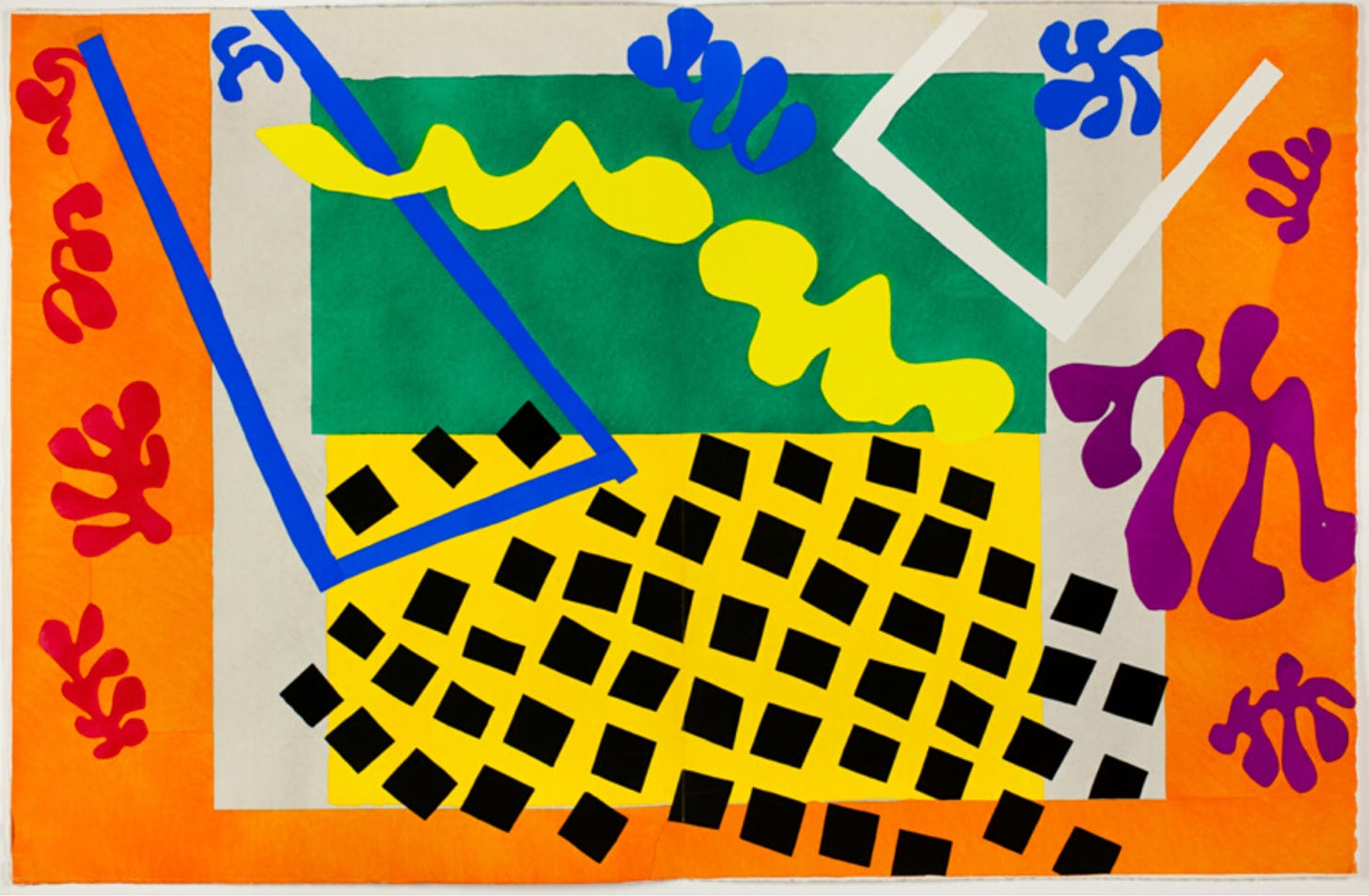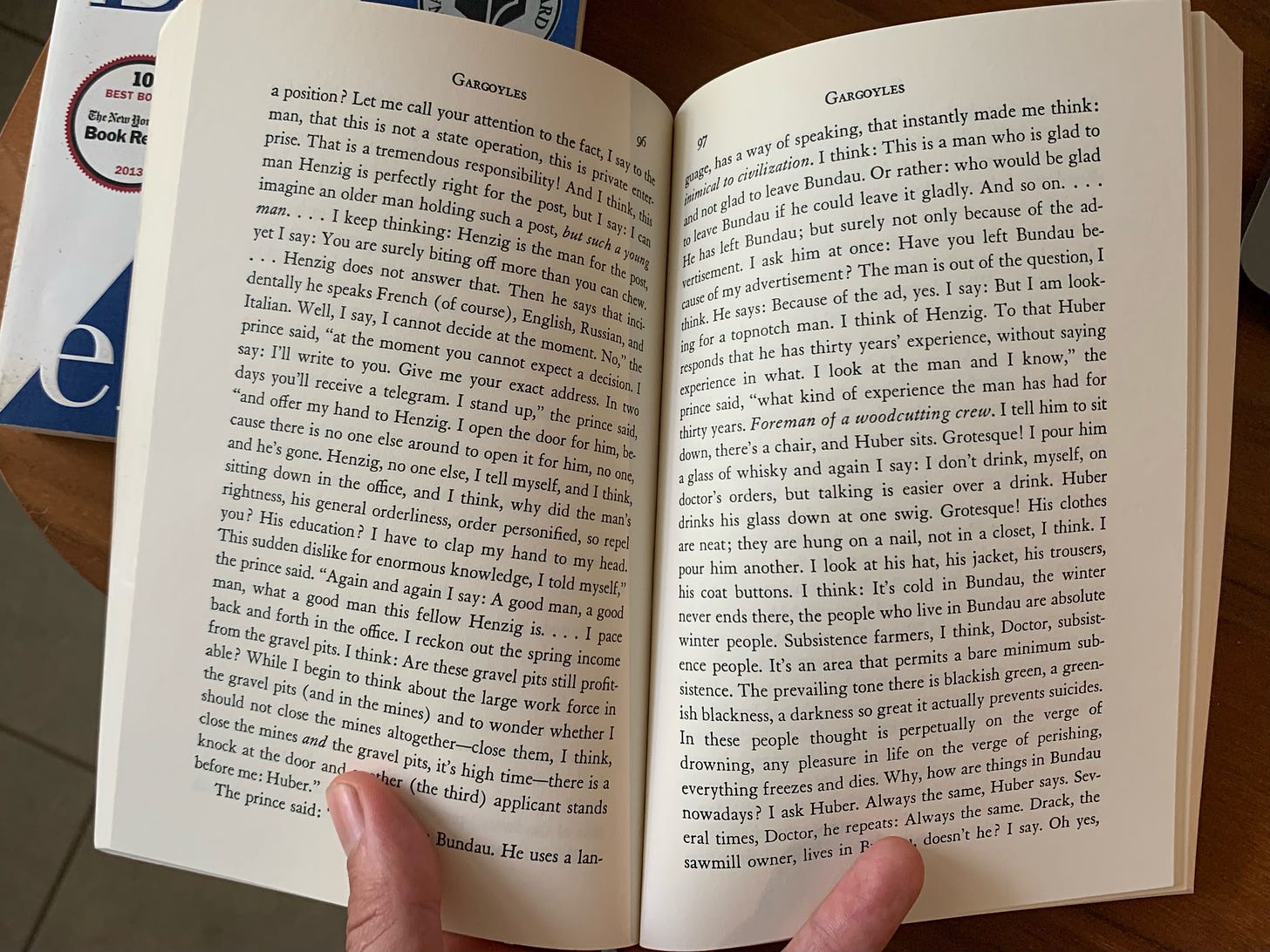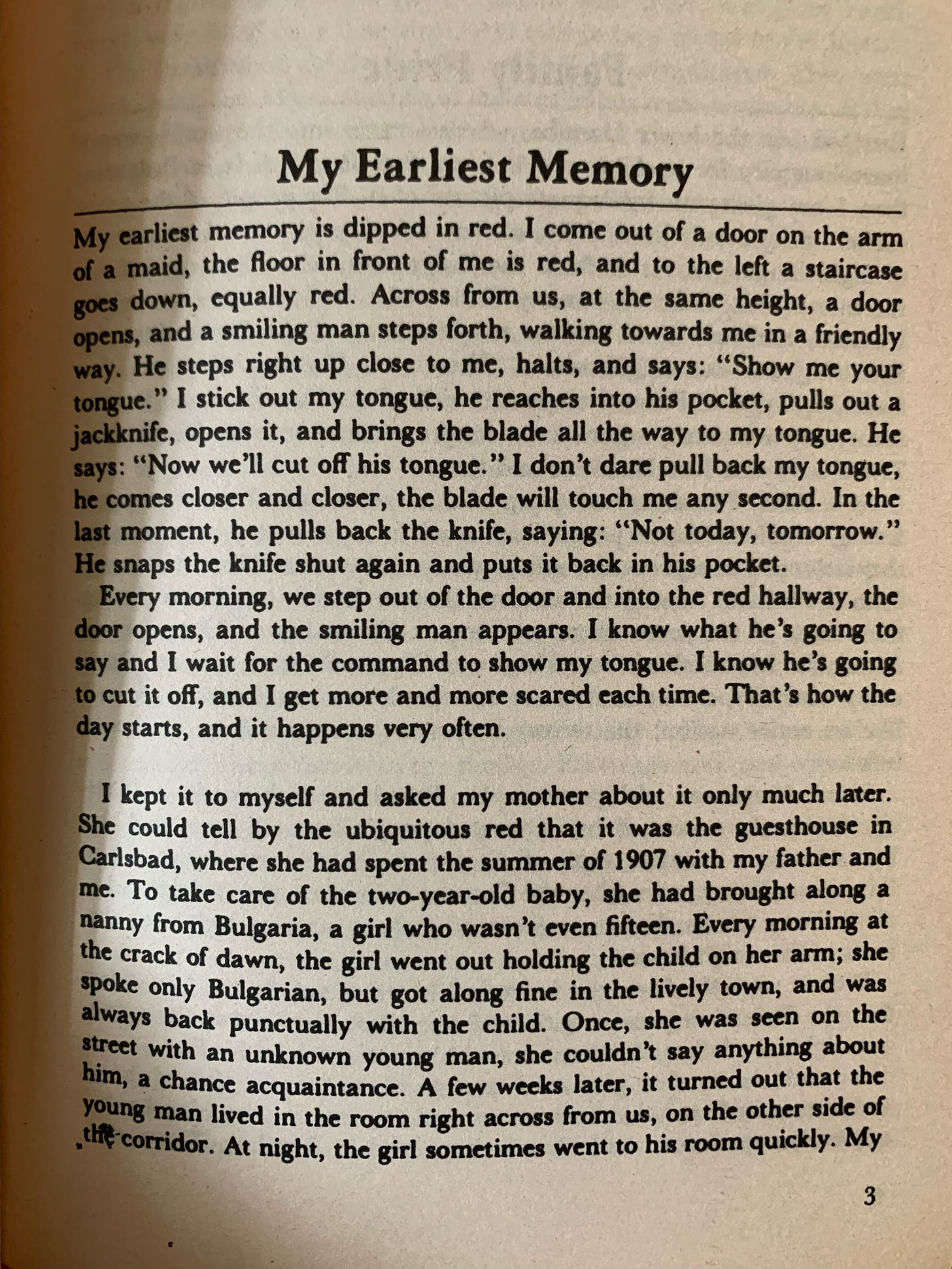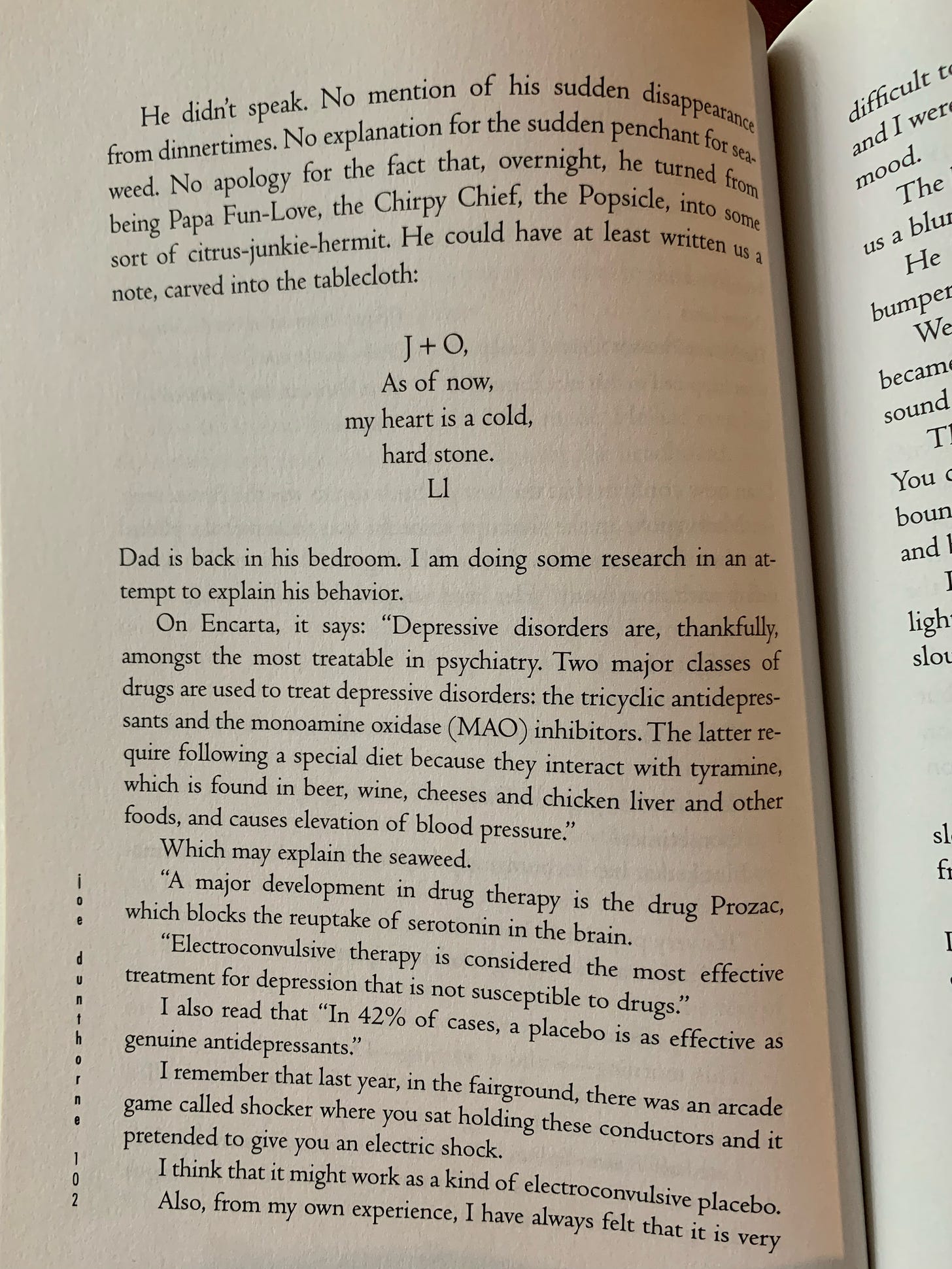What it means to make your writing feel "new"
Or at least, an attempt at understanding what newness is in writing and other art forms.

No. 96: What it means to make your writing feel “new”
I don’t remember the quote exactly, but Tobias Wolff once gave George Saunders a warning when it came to writing.
“If it isn’t new, it’s just another museum piece.”
This line of thinking explains a lot of what Saunders does — and really, what most of my favorite writers do or have done.
They look forward, not back. They take risks. They attempt to write in such a way that one of the world’s oldest mediums feels new.
Which is hard.
Writing as an art form is inherently antiquated. If you’re not careful, you can quickly begin to sound like a lawyer . . .
Due to circumstances out of his control John got to the train station at half-past his intended arrival time.
A last vestige of the Victorian era . . .
Those who have made the jaunt from Downing Street to the Pinegree Station are well acquainted with the nature of Chicago, a city that prefers to lay obstacle after obstacle in the path of any person needing to be somewhere while providing the smoothest imaginable passage to every odd wanderer out for an afternoon stroll. John was no exception. Having scheduled a five o’clock meeting, his arrival was delayed by a crowd amassed around toppled buggy.
The second coming of Alexander Hamilton . . .
Although John had made the greatest effort, effort alone was not enough to render him at the appointment at the determined time.
But that’s only style.
Using a modern style is one way to approach newness, especially in mediums like cinema, sculpture, or art installation, where feats of engineering, 3-D projectors, or special effects can be employed to dazzle and entertain. Think Avatar or Star Wars, for cinematic examples.
Great films. Incredible special effects.
Which is when it becomes interesting to consider a movie like Eternal Sunshine of the Spotless Mind by contrast, a film considered new and different both today and when it was released, and one that I’d say is as good, if not better, than Star Wars or Avatar despite its complete lack of special effects.
Newness boils down to story, then.
Newness boils down to story, then?
As you’re probably realizing, this a rabbit hole conversation that I regret choosing for this week’s letter, but I’ll press on so long as you will.
When it comes to a work of art feeling new, it’s not one aspect or another but everything combined. In writing, that usually means some sublime mixture of narrative style, writing style, and subject matter. Then of course, there’s the unsayable X factor. And at the risk of inspiring death threats from my readers, that’s pretty much all I can say about What Makes Writing Feel New or How to Make Your Writing Feel New.
The thing is, that feeling of newness when reading some avant-garde writer? The sensation that makes older works — which felt new when they were released and sometimes still do — stand the test of time? They are just that, feelings and sensations. They can’t be readily summarized with words alone. (Which makes for a nice irony).
All I can do, then, is show you some of the writing that has struck me as new.
1. Sterling HolyWhiteMountain’s playful and varying prose
Me, I was a simple reservation boy. I always had a stalk of grass betwixt my lips. I squinted at the sky and commented in profound tones on the weather. Like a good tourist, I wanted to witness the best the big city had to offer. I went to parties and laughed in a genuine way with white boys—backslaps and tough handshakes and big grins. I got stupid drunk and pressed my hands between the thighs of white girls in dimly lit alleys. All the truly worst kisses happen in such places. I always asked those girls to take me home—and sometimes they did! I wanted to see where they lived almost as much as I wanted to see them naked. I wanted to get a feel for the glory of another kind of life. There was always something comfortable about those rooms, even when they were spare, something plush as we flopped and rolled and groaned in the sheets. What a wonder the young are. The world is a conflagration and they find nothing to do but play grab-ass.
— Excerpt from the short story “Featherweight” by Sterling HolyWhite Mountain (New Yorker)
2. George Saunders’ interesting settings, use of language, and a literal diagram
3. Thomas Bernhard’s unique subject matter, spare use of paragraphs, and complete absence of chapters

4. Joe Dunthorne’s serious unserious humor
5. Annie Ernaux’s perceptiveness and ability to articulate relatable experiences (she also just won the Nobel Prize for Literature)
It was a summer with no distinguishing meteorological features, the summer of de Gaulle’s return, the new franc and the New Republic, of Pelé, champion of world soccer, of Charly Gaul, winner of the Tour de France, and Dalida’s Mon histoire est une histoire d’amour.
A summer as immense as they all are until one is twenty-five, when they shrink into little summers that flit by more and more quickly, their order blurred in memory until all that remains are the ones that cause a sensation, the summers of drought and blazing heat.
— Excerpt from the autobiography A Girl’s Story by Annie Ernaux
6. Elias Canetti’s visceral style of memoir

One way of interpreting Wolff’s warning to Saunders is that museum pieces are bad.
I think this interpretation misses the point.
Museum pieces are great — as museum pieces.
We go to museums to appreciate all that has come before us. To be inspired.
But museums are not studios or places of creation, really.
My bookshelf is my museum, and I love it. But my task as a writer is not to mimic what’s on my shelf, but to create something so new and different and good that it’s worthy of resting on someone’s shelf twenty years from now.
The good part? The possibilities are endless.
The hard part? The possibilities are endless. ♦
Weekly Three
HEAR: “Intimidated (ft. H.E.R.)” by Kaytranada
READ: The full excerpt from A Girl’s Life by Annie Ernaux, the French writer who just won the Nobel Prize for Literature.
VIEW: In about an hour, I’m heading out on a ~500 mile road trip (with a camping stop) in the roadster I wrote about recently. Very excited. Here’s the route.







John Steinbeck. I first read him more than forty years ago, after he had died (so not even new writing then). The depth, clarity and simplicity he achieved with very basic English astounded me. Steinbeck did not seem to want to impress the reader, he wanted to communicate. He had something to say. Re-read recently, his ability to formulate multi-layered complex threads of information in short bursts of simple language, leaves me, with my tendency to digress off piste constantly, in awe. It's still so fresh. Like a cowboy of few words, yet words chosen perfectly. He'd clean up on Twitter.
e?e. cummings did away with capitals. Texting is doing away with punctuation IMHO as well as nuance but who cares about punctuation anyway just some old grannies with horn rimmed cats eye glasses I mean really